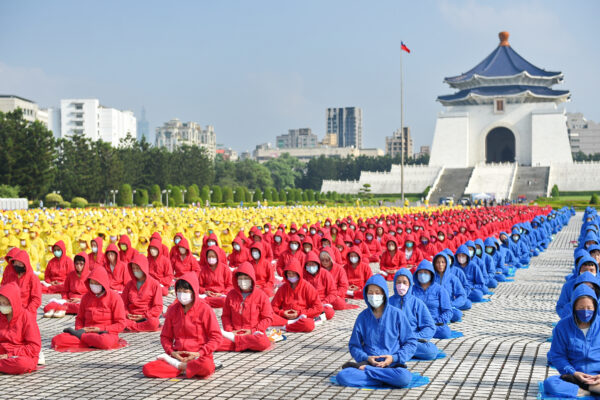
More than 5,000 people formed the image of a ‘Law Wheel’ (Falun) and words in Chinese characters on Liberty Square in Taipei, Taiwan, Nov. 12, 2022. (Chen Po-chou/The Epoch Times)
By
TAIPEI—Liberty Square, Taiwan’s iconic tourist site, was awash in a sea of colors on Nov. 12, as more than 5,000 locals came together to deliver a message to communist China.
Their message was straightforward—while the communist regime continues to brutally persecute Falun Gong in China, across the strait in Taiwan and around the world, millions of people freely practice the spiritual discipline, and have done so for decades.
Falun Gong, also known as Falun Dafa, consists of moral teachings based on the principles of truthfulness, compassion, and forbearance, along with daily meditative exercises. Since its introduction in China in 1992, the practice has surged in popularity leading to an estimated 70 million to 100 million adherents in the country by the end of the decade.
But such popularity was deemed a threat by the ruling communist regime, which launched an expansive persecution campaign against Falun Gong practitioners in 1999. Millions of adherents have since been detained, according to Falun Dafa Information Center, and an untold number have died due to torture or forced organ harvesting.
On Saturday, in the capital of the democratic island of Taiwan, local Falun Gong practitioners, dressed in either yellow, blue, red, black, or white, sat on the square, arranged to form a massive version of the practice’s emblem, known as the Falun or Law Wheel. Beneath the emblem people formed a short phrase containing seven gigantic words in traditional Chinese characters. The activity commemorated the 30-year anniversary of the spiritual practice’s introduction in China.

More than 5,000 people gather to take part in a character formation at Liberty Square in Taipei, Taiwan, on Nov. 12, 2022. (Chen Po-chou/The Epoch Times)
Hsiao Sung-shan, an engineering professor at National Taiwan Ocean University and chairman of the Taiwan Falun Dafa Association, said in a statement that choosing to form the emblem had the specific aim of “conveying a peaceful, bright, and sacred positive energy” to society.
“The emblem is very sacred in the hearts of Falun Dafa practitioners,” Hsaio said, adding that doing the exercises has brought hope to countless adherents.
He expressed hope that people who witness the formation—whether seeing it in person at Liberty Square or in images online—will be tempted to learn more about the practice. According to Hsaio, more than 100 million people in 114 countries and regions have taken up the practice.
Hsiao explained that it was practitioners in China who held the very first such formation in 1996, before the regime began persecuting the practice. That tradition now lives on in Taiwan, he added, saying that Taiwanese practitioners have organized the word formation activity annually since 2000.
“I hope that the Chinese Communist Party can soon end the persecution, allowing China to be like the rest of the world, where people can practice Falun Gong freely,” Hsaio said.
Character Formation
To make it possible to form an image, practitioners in Taipei spent three days making preparation at Liberty Square. They manually taped thousands of colored mats to the ground—with the mats serving as contours that make up the formation—in a predetermined pattern.
On Saturday, practitioners, grouped by the color of their outfits, walked onto the square and sat on a mat of the corresponding color.
Wu Ching-hsiang, a retired architect who created the blueprint for the formation, told The Epoch Times that there are other character formation events in the world, such as people joining together to save the ocean or protect the environment.
However, those events are on a smaller scale than Taiwan’s annual character formation, according to Wu.
Huang Chun-mei, organizer of the activity and deputy chairman of the Taiwan Falun Dafa Association, also spoke with The Epoch Times. She said the annual event has been well-received by many Taiwanese. As an example, she pointed to her daughter’s professor, who has been following the annual character formation as well as other local Falun Gong activities for years.
For people who don’t know about Falun Gong or don’t understand why so many practitioners remain steadfast with their cultivation in China despite the persecution, Wu encourages people to read “Zhuan Falun,” the main book of teachings for Falun Gong, saying that it has been translated into many languages, including English.
Self-Improvement
Liberty Square is a popular weekend getaway spot in Taiwan, some people go there simply for sightseeing, while others take a stroll or get-together with friends or family.
While the character formation was unfolding, many people gathered nearby and watched the event. Some took pictures with their phones. Among those watching was a local high school teacher surnamed Chen.
“I am quite touched. All of these people have chosen to practice [Falun Gong]. And they can all sit there for a long time, and there is no disorder, despite the hot weather,” Chen told The Epoch Times, commenting on the Falun Gong adherents taking part that day.
Chen added that she is aware of China’s persecution of Falun Gong, as she subscribes to the Taiwan edition of the Chinese-language Epoch Times, which reports on what is happening.
She said the world would be a better place if more people were like Falun Gong practitioners. As for her, she said she is in the process of getting to know more about the spiritual discipline.
After the character formation was over, practitioners did the meditative exercises together before leaving the square.

5,000 Falun Gong practitioners meditate on Liberty Square in Taipei, Taiwan, on Nov. 12, 2022. (Pai Chuan/The Epoch Times)
Two of the people taking part in the image formation spoke to The Epoch Times, explaining why they have persevered as Falun Gong practitioners.
Huang Jeen-dar, 56, a deputy manager at an IC design company, said he began practicing Falun Gong around late 2004, after reading the “Nine Commentaries on the Communist Party,” that exposed the nature and history of Chinese communist rule. The Chinese-language Epoch Times published the articles in a series of editorials beginning in 2004.
Huang said he has come to understand the meaning of life. That it is not about making a lot of money and being defined solely by one’s achievements. Instead, he said life is about improving one’s character.
Restaurant owner Lin Ge-zhi, 53, has been a practitioner since 2008. After years of following the discipline’s three principles, he said he has become a better person.
He explained that he used to suffer from allergic rhinitis and often had seasonal flu, but those physical problems are long gone since he started cultivating his character.
“Back then when I was doing my job, it was more about money and fame. I was lost in my life,” Lin said. “Now, those things matter less … And I don’t have a bad temper anymore and have an easy-going personality.”